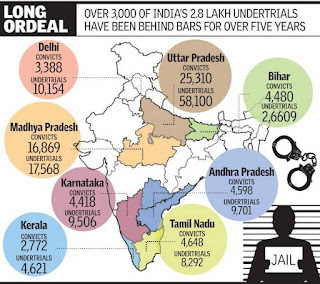On the long flight to India, I was browsing and came across an Indian film "Qaidi Band" or "Prisoner's Band". I had not heard of the film, yet was intrigued by the name and decided to watch it.
The film was average, and yet the underlying premise and the facts presented were unbelievable and horrific. It was about under trials in Indian jails who spent years for fairly trivial crimes, without having been found guilty by any court. They were persons who were not well off and could not afford expensive legal help to be out on bail awaiting the trial.
The sad part was that in a significant large number of cases, the time spent by these under trials in jail was greater than the maximum sentence that they would be given, assuming they were found guilty. This makes absolutely no sense no matter what your point of view. It goes against all tenets of natural justice that we as humans know.
I subsequently found that this is not an unknown issue and there are several non-profits are working on the problem.
To me, an obvious solution, which no stakeholder can oppose is that on completion of the maximum time the under trial could get, if found guilty, they should be set free. They should then be given an option of pleading guilty and the case closed or pleading not guilty and the case could continue as would be the normal course. The major difference the under trial is not in jail, but truly as the name implies, "Under Trial".
This kind of approach has several upsides and not a single downside that I could think of or any of the several people I discussed the issue with could come up with.
The primary upside is the obvious one. Undertrials are no longer spending a lifetime in jail. Additionally there are several secondary benefits. The courts get freed of hundreds of thousands of cases and can focus on resolving the balance ones. This itself will mean speedier trials and a more efficient justice system. In a relatively short period of time the clogging of courts will be reduced significantly. And the current major problem, resolves itself.
While this is not at all a perfect solution, its significantly better than the current system. And we should never let Perfect be the enemy of the Good.
There are several interesting articles on this subject that you may like to review.
Justice Under Trial: A Study Of Pre-Trial Detention In India
https://amnesty.org.in/justice-trial-study-pre-trial-detention-india/
Six charts explain how undertrial prisoners in India are denied the right to fair trial
https://scroll.in/article/843539/six-charts-show-how-undertrial-prisoners-in-india-are-denied-the-right-to-fair-trial
Trials and tribulations of undertrials in India
https://www.dailypioneer.com/2017/columnists/trials-and-tribulations-of-undertrials-in-india.html
And the article that brought a ray of hope.
Corporates join hands to help prisoners jailed without trial
https://economictimes.indiatimes.com/news/politics-and-nation/corporates-join-hands-to-help-prisoners-jailed-without-trial/articleshow/62953228.cms
I on my part have decided to do something about it, in whatever small way I can. I hope you will too.
The film was average, and yet the underlying premise and the facts presented were unbelievable and horrific. It was about under trials in Indian jails who spent years for fairly trivial crimes, without having been found guilty by any court. They were persons who were not well off and could not afford expensive legal help to be out on bail awaiting the trial.
The sad part was that in a significant large number of cases, the time spent by these under trials in jail was greater than the maximum sentence that they would be given, assuming they were found guilty. This makes absolutely no sense no matter what your point of view. It goes against all tenets of natural justice that we as humans know.
I subsequently found that this is not an unknown issue and there are several non-profits are working on the problem.
To me, an obvious solution, which no stakeholder can oppose is that on completion of the maximum time the under trial could get, if found guilty, they should be set free. They should then be given an option of pleading guilty and the case closed or pleading not guilty and the case could continue as would be the normal course. The major difference the under trial is not in jail, but truly as the name implies, "Under Trial".
This kind of approach has several upsides and not a single downside that I could think of or any of the several people I discussed the issue with could come up with.
The primary upside is the obvious one. Undertrials are no longer spending a lifetime in jail. Additionally there are several secondary benefits. The courts get freed of hundreds of thousands of cases and can focus on resolving the balance ones. This itself will mean speedier trials and a more efficient justice system. In a relatively short period of time the clogging of courts will be reduced significantly. And the current major problem, resolves itself.
While this is not at all a perfect solution, its significantly better than the current system. And we should never let Perfect be the enemy of the Good.
There are several interesting articles on this subject that you may like to review.
Justice Under Trial: A Study Of Pre-Trial Detention In India
https://amnesty.org.in/justice-trial-study-pre-trial-detention-india/
Six charts explain how undertrial prisoners in India are denied the right to fair trial
https://scroll.in/article/843539/six-charts-show-how-undertrial-prisoners-in-india-are-denied-the-right-to-fair-trial
Trials and tribulations of undertrials in India
https://www.dailypioneer.com/2017/columnists/trials-and-tribulations-of-undertrials-in-india.html
And the article that brought a ray of hope.
Corporates join hands to help prisoners jailed without trial
https://economictimes.indiatimes.com/news/politics-and-nation/corporates-join-hands-to-help-prisoners-jailed-without-trial/articleshow/62953228.cms
I on my part have decided to do something about it, in whatever small way I can. I hope you will too.




No comments:
Post a Comment